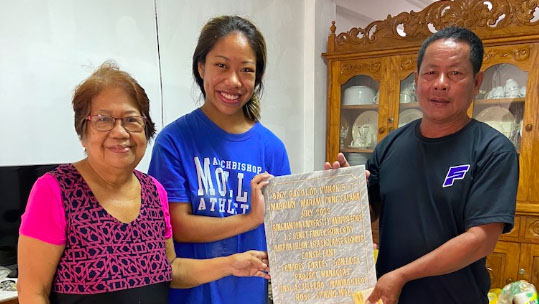Helping hand: Harpur Fellow brings clean water to a community in the Philippines

Think about it: How much water do you use every day to wash your hands, brush your teeth, flush the toilet? How often do you fill up your water bottle or put a pot of water on the stove?
In parts of the Philippines, clean water isn’t just a faucet away. Families in a small community in the municipality of Irosin had to travel long distances for potable water, which they carried in buckets back to their homes. With only one toilet available, even daily hygiene could be fraught, explained Ashleigh Requijo, a Harpur College junior majoring in philosophy, politics and law, and minoring in human rights, global studies, and women, gender and sexuality studies.
But life has changed in Puroks 5 and 7 in Bacolod— as the neighborhoods are known — thanks to Requijo’s Harpur Fellows project. She received $4,000 in grant funding for her project, made possible by the generous support of Harpur College alumni and donors. She used that funding to bring needed sanitation infrastructure to the community, whose needs she learned about through her grandparents.
She visited the country — where her grandparents still live — for the first time this summer. Although exacerbated by damage from Typhoon Rai, access to clean water has long been an issue in the Philippines as well as other countries in the developing world, Requijo explained.
“Water pumps are not centrally located and work to install them by the government is very slow,” Requijo said.
Coordinating an infrastructure project in a foreign country is challenging, especially when you add in a language barrier. Requijo has limited knowledge of Tagalog, the national language of the Philippines, but the project manager instead spoke Bicol, a completely different dialect. Her grandmother, Lourdes, translated during multiple meetings with the project manager, in which they discussed the exact locations of pumps and tanks, toilet bowl purchases and budgeting.
All told, the team installed four water pumps, two septic tanks and eight toilet bowls, as well as an updated underground sewage system. The remaining money purchased school supplies for local children, including notebooks, pens, paper, crayons and more.
“I learned that in terms of equitable justice and providing access to basic resources, it all comes down to money,” Requijo reflected. “There is no shortage of people willing to make a difference, but there is an unfair distribution of wealth.
Her first memory of the trip: Stepping off the plane, the humidity washed over her, fogging her glasses. While in the country, she saw waterfalls and intense natural beauty, and had rewarding interactions with members of the community she aided.
“All of the children were so excited to meet me and the smiles on their faces showed me upfront how much easier their lives will be now that they have water for laundry or a toilet to go to the bathroom,” she remembered. “The whole experience showed me that even though there was a language barrier, you can easily connect with someone when you’re sharing such a joyous moment together.”
The community’s families and the mayor have since written to Requijo, expressing their thanks. Word gets around quickly in villages, and other communities have started to ask Requijo’s grandmother for help installing a water pump near their homes.
Requijo hopes to build on her project, eventually starting her own nonprofit, in addition to earning a law degree. Recently, she has been networking with Binghamton alumni who work within the nonprofit sector, who shared personal tips and insight on what it takes to start an organization. Professors also have shared thoughts and suggestions on a mission statement that Requijo is drafting.
“Being a Harpur Fellow has really enabled me to embrace my passion for community service and opened my eyes to the work that I need to do,” Requijo said. “I’ll never forget standing under the hot sun, being on the ground, connecting with the families and kids, and seeing what a difference we can make in the world! It’s a once-in-a-lifetime opportunity to do work like this, and it really gave me that green light to keep pushing within the nonprofit space and help those who could only dream of what we have here in the United States.”
